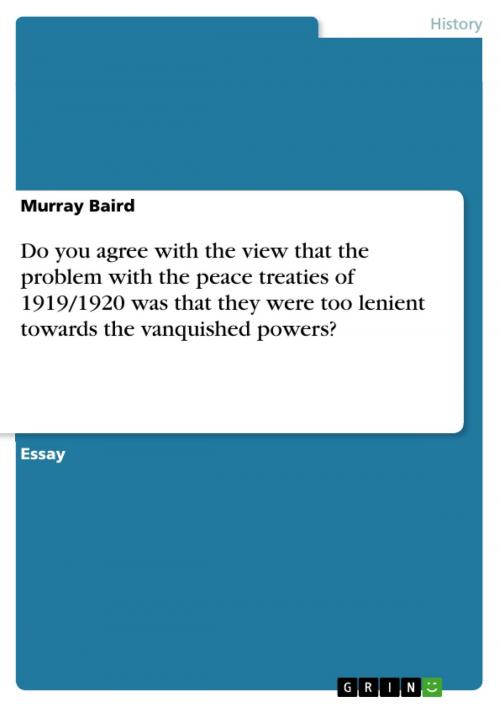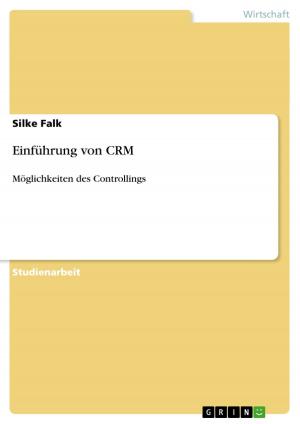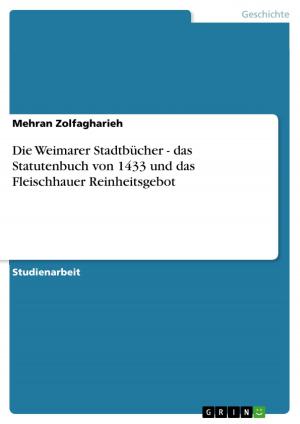Do you agree with the view that the problem with the peace treaties of 1919/1920 was that they were too lenient towards the vanquished powers?
Nonfiction, History, Germany| Author: | Murray Baird | ISBN: | 9783656292531 |
| Publisher: | GRIN Verlag | Publication: | October 18, 2012 |
| Imprint: | GRIN Verlag | Language: | English |
| Author: | Murray Baird |
| ISBN: | 9783656292531 |
| Publisher: | GRIN Verlag |
| Publication: | October 18, 2012 |
| Imprint: | GRIN Verlag |
| Language: | English |
Essay from the year 2002 in the subject History Europe - Germany - World War I, Weimar Republic, grade: 1B, University of Stirling, course: Modern European History 1919 - 1991, language: English, abstract: The deliberations of the peacemakers between 1919 and 1920 failed to establish an enduring peace for multifarious reasons, but not because the peace treaties were too lenient towards the vanquished powers. After all, the negotiators did not begin with a blank piece of paper. Rather, certain curbs were placed on them. Technically defeated, but practically unoccupied the Central Powers, and in particular Germany, remained largely intact and the pre-war counterweight to German power in the form of the Russian and Habsburg Empires no longer existed. Concomitantly, encroaching Russian Bolshevism created a dichotomy as to the treatment of the vanquished powers. Moreover, the main players in the peace conferences brought with them not only their varied personalities but also their different aims and aspirations, tempered by domestic political strategy and public opinion. President Wilson's Fourteen points raised expectations too high and clashed both with reality and the imperialistic aims of other peacemakers. In addition, the imbroglio that was rampant post-war nationalism was neither fully understood nor remedies consistently applied. Finally, the open sore created by the so-called war guilt cause and reparations festered until it became a cancerous growth consuming the very tissue of the peace treaties and simultaneously gave the vanquished nations reasons to break the treaties.
Essay from the year 2002 in the subject History Europe - Germany - World War I, Weimar Republic, grade: 1B, University of Stirling, course: Modern European History 1919 - 1991, language: English, abstract: The deliberations of the peacemakers between 1919 and 1920 failed to establish an enduring peace for multifarious reasons, but not because the peace treaties were too lenient towards the vanquished powers. After all, the negotiators did not begin with a blank piece of paper. Rather, certain curbs were placed on them. Technically defeated, but practically unoccupied the Central Powers, and in particular Germany, remained largely intact and the pre-war counterweight to German power in the form of the Russian and Habsburg Empires no longer existed. Concomitantly, encroaching Russian Bolshevism created a dichotomy as to the treatment of the vanquished powers. Moreover, the main players in the peace conferences brought with them not only their varied personalities but also their different aims and aspirations, tempered by domestic political strategy and public opinion. President Wilson's Fourteen points raised expectations too high and clashed both with reality and the imperialistic aims of other peacemakers. In addition, the imbroglio that was rampant post-war nationalism was neither fully understood nor remedies consistently applied. Finally, the open sore created by the so-called war guilt cause and reparations festered until it became a cancerous growth consuming the very tissue of the peace treaties and simultaneously gave the vanquished nations reasons to break the treaties.















